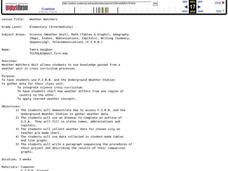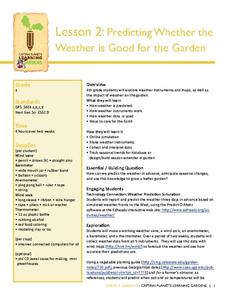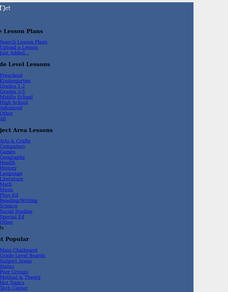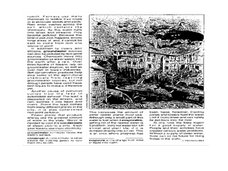Curated OER
Use Or Abuse?
Students explain the meaning of "use value" of nature's resources by researching and writing studenT books personifying an aspect of nature. They produce public service announcements regarding use value for their local community.
Curated OER
Just Turn it Off
Students explore energy. In this energy lesson, students discover why it is important to conserve energy. Students discover how energy is used in items we use everyday. Students discover how batteries work. Students do an experiment with...
Curated OER
Weather Watchers
Students are introduced to an Underground Weather Stations. In groups, they use the internet to research the weather in different parts of the United States locating each city. To end the lesson, they summarize the information they...
Teach Engineering
Weather Forecasting
According to the Farmers' Almanac, the weather will be nice today. Class members examine how weather forecasting plays a part in their lives with a resource that provides information on the history of forecasting, from using cloud...
Curated OER
Illinois Biodiversity
Students examine the amount of biodiversity in the state of Illinois. They practice using new vocabulary and listening to stories about animals. After given time to reflect, they write their own haiku. They work together to create a...
Captain Planet Foundation
Predicting Whether the Weather is Good for the Garden
Can your class predict the weather? Show them how they can come close with a lesson about creating weather instruments, including weather vanes, barometers, wind socks, anemometers, and thermometers. Kids research weather patterns and...
Curated OER
Electricity--More Power to Ya!
Fourth graders use research tools to access and synthesize information. They gather and manipulate data using technology. Research and study the components of an electrical circuit. Create a brochure that demonstrates knowledge of how to...
Curated OER
How Much Water is There?
Students investigate the amount of fresh water on earth and which water can be used for consumption. In this fresh water lesson plan, students calculate the amount of fresh water that can be used for consumption on earth. They use a 5...
Curated OER
Cooperative Learning, Sci., Tech., Lang
Students research, write, edit, revise and present a paragraph, using word processor, about animal of their choice, including description, where animal lives, what it eats, its habits, e.g. is it endangered, migration, hibernation,...
Curated OER
The Solar System
Students construct a sketch of the planets in our solar system using concentric circles and angles. In this solar system lesson plan, students plot the position of each planet on concentric circles using graph paper. The sun is included...
Curated OER
Prairie Restoration and Prairie Ecology
Students collect data as they identify and classify native prairie plants and insects. They create their own population study using a variety of sampling techniques to determine the population density of various species. Students...
Curated OER
DNA-B-C's
Young scholars review what they already know about DNA. After reading an article, they discover a new technique to map the course of evolution. In groups, they create ways to present this material to younger children and research DNA's...
Curated OER
A Site to See
Students identify the risks and benefits of living next to a volcano. After reading an article, they discuss the behaviors of an active volcano. Using the Internet, they work together to research volcano-monitoring techniques and create...
Curated OER
You are Uniquely You
Students compare and contrast simple machines and their functions. In this cross-curriculum science simple machines lesson, students observe examples and read about simple machines, then use body movement to demonstrate how machines...
Curated OER
Moon Phase Bulletin Board Lesson Plan
Students create a poster board showing the phases of the moon. They use the Internet to research the different phases and examine the calendar. They discuss what patterns they notice occuring.
Curated OER
Biomes and Regions of the United States
Young scholars examine and identify the characteristics of the biomes of the world. Using the Internet, they compare and contrast the similarities and differences and discover how living things are supported in the biomes. They discuss...
Curated OER
Habitat Cards
Students discuss the relationship between a habitat and the environment. In groups, they use the internet to research the relationship between the animals and the habitat on their card. They present their information to the class to...
Curated OER
Agriculture is a Cycle
What do a bicycle and the life cycle have in common? Cover this and more with the series of cross-curricular activities included in this plan. Learners do everything from making bracelets that represent the life cycle to checking out the...
Curated OER
The Art and Soul of the Land
Students study conservation and how different communication styles used by different conservationists. In this conservation lesson students obtain information on a cartoon or a few quotes from a conservationist and are ask to describe...
Curated OER
How Old Is Old?
Students explore longevity in the United States and the impact of one living longer. Statistics are used to identify life expectancy of an individual from his or her birth. Gender differences are investigated.
Curated OER
Cloud Database
Students research information on the types of clouds. They create a database and use a formula. They create various reports and access electronic information to obtain accurate pressure and temperature readings from the National Weather...
Curated OER
Researching Alternative Energy
Sixth graders investigate the concept of energy using a hypothetical story. The power goes out in their house and they no longer can play your videogames. Students must create your own alternative power source. This story sets the stage...
Curated OER
Tulips: Predicting the Arrival of Spring
Learners use the blooming of tulips as a tool to measure spring's journey north. They predict when tulips bloom at 13 selected Journey North gardens in various geographic regions.
Curated OER
Why Here? Why Not There?
Young scholars analyze a map and graph information on eleven countries. Using the characteristics of the countries, they determine if they should host the summer or winter Olympic games. After viewing a video, they locate the latitudes...

























